情态动词(讲解版)
情态动词(基础讲解)

情态动词的用法【用法讲解】考试要求:中考要求掌握情态动词在一般疑问句的问与答,理解情态动词表示猜测的用法及情态动词的被动语态应用.情态动词表示说话人对某一动作或状态的态度,认为“可能”,“应该”或“必要”等。
情态动词本身词义不完全,不能独立作谓语动词,必须和动词原形连用(ought除外)。
情态动词没有人称和单复数的变化。
常用情态动词有can(could),may(might),must, ought to,have to,need, dare, shall(should),will(would)。
1. 情态动词can 和could的主要用法(1)表示能力,意为“能,会”。
Can you swim? 你能游泳吗?His granny is over eighty but still can read without glasses。
他的奶奶虽然八十多岁了,但是仍旧不用戴眼镜能够阅读。
注意:can和be able to表示“能力”时的区别:can只有现在式和过去式两种形式,而be able to除了现在式和过去式,还有将来式和完成式等多种形式.She will be able to help you tomorrow afternoon。
明天下午她将能帮助你.This is the information that I have been able to get so far.这是我到目前为止能得到的信息。
(2)表示“许可,允许"。
can 和could没有时态上的区别,could比can在语气上更客气;在回答could引导的一般疑问句时要用can。
Could/Can you tell me the way to the railway station?你能告诉我去火车站的路吗?—Could I use your pen?我可以用你的钢笔吗?—Yes,of course you can。
是,当然你可以。
情态动词详细讲解

情态动词情态动词表示说话人对动作或状态的各种观点和态度,如需要、猜测、意愿或怀疑等。
情态动词有词义,但不完全,是所谓的“辅助性”动词,在句中不能单独充当谓语。
一、情态动词的特征和形式A.情态动词的各种形式如下:情态动词may、might 、can、could、must、have to、ought to、will/ would、shall/should、need、dare、used to否定式may not、might not、can not 、could not、must not、do not have to、ought not to、will not、would not、shall not、should not、need not、dare not、used not to、did not use to简略否定式mayn't(老式英语,现在不常见)、mightn't、can't、couldn't、mustn't、don't have to、oughtn't to(否定句中to可省略)、won't、wouldn't、shan't(只用于英国英语)shouldn't、needn't、daren't、usedn't to、didn't use toB.情态动词除ought to, used to等外,后面只接不带to的不定式。
1.情态动词+doYou shouldn't be so careless.你不该这样粗心大意。
Jessica told him yesterday she might not go on the trip.杰西卡昨天告诉他,她可能不去旅行了。
Difficulties can and must be overcome.困难能够而且必须克服。
2.情态动词+be doingShe must be listening to pop music.她肯定在听流行音乐。
情态动词讲解

情态动词讲解情态动词1.表示能力时,只能用can (现在) could do (过去能做)was/were able to do:(1)过去能做( 2 ) 过去设法成功完成某一具体动作 =manage to do=succeed in doingEg. 1.A blind man can not judge colors.2.He could/was able to swim like a fish when he was young.3.Though he was tired , he was able to swim across the river.4.Because he was tired, he couldn’t /wasn’t able to swim across the river.(在否定结构中无区别)2.表推测时:may/might( 语气最不肯定,多用于肯,否定句) 可能can (语气肯定,一般不用于肯定句)可能could (较can不确定,也可用于肯定句) 可能must (语气最肯定,只用肯定句)一定should(表可能性,推论,推测,期待等)按理该;估计ought to (表可能性,揣测,猜测,期望等)照说应该,理应may/might have +ed (语气不肯定) 过去可能……can’t/couldn’t have +ed (语气肯定)过去不可能……must have +ed (语气肯定) 过去一定should have +ed 过去按理应该ought to have +ed 过去按理Eg. 1.A: Look, someone is coming. Who can it be?B: It may be the headmaster.A:It can not be him.He has gone to Shanghai.B: It must be Mr Zhang. He looks like the headmaster.2.I don’t know his age. He could be thirty or thirty-five.3. The report is written after careful investigation, so itshould be reliable.4.---I didn’t see Mary at the meeting yesterday.---She might have been ill, I guess.5.The street are all dry. It couldn’t have rained during the night.3. 表责备时:may/might have +ed(语气委婉)过去本可能…can/could have +ed (语气委婉) 过去本能……should have +ed (语气强烈) 过去本应该……,而未……ought to have +ed (语气强烈) 过去本应该……,而未……needn’t have +ed 过去本不必…,却做了…Eg. 1.He might have given you more help, even though he was very busy.2.---Did you listen to the speech?----No, we could have attended it.But we had a lot of traffic on our way.3.The plant is dead. Maybe I should have given more water.4.Your brother’s failed in English again. You ought to have given him more help.5. ---Mr Smith didn’t come last night, did he?---- No. We needn’t hav e waited for him. A whole night was wasted. 4.表未曾实现:was/were to have +ed 过去本打算/本想……should like /love to have +ed 过去本想…… 而没……=would like/love to have +ed =should have liked /loved to do=would have liked/loved to dohad better have +ed 当初最好……would rather h ave +ed 当初真该……Eg. 1. He was to have come here yesterday, but he had an important meeting to attend.2. We would like to have gone to see the film, but we had no time.3. I would love to have gone to the cinema to see the film that day, but thetickets were all sold out.4. I should have liked to stay another week, but I had to go back to work.5.We had better have bought (当时真该买) the book.6.She would rather have stayed (当初真该呆) at home than go to see the dullfilm.5. 委婉的请求肯定的答语could canmight maywould willEg. 1. ---Could you lend me your book?---Certainly, I can.2. ---Might I ask you a question?---Surely, you may.3. ---Would you do me a favor?---Of course, I will.4. ---Would you like to do it for me?---Yes, I’d like to. ( 特殊)7. Shall : 可用于一、三人称表示征询对方意见或请求指示Eg. Shall he wait for you at the gate?Shall we begin our lesson?Shall 用于第二、第三人称,表示说话人对对方的命令、警告、允诺或威胁。
情态动词讲解归纳

链接中考语法:情态动词一、情态动词的特点:情态动词,又叫情态助动词。
它们具有以下特点:⑴它们必须与其他动词连用,即:情态动词+动词原形,表示说话人对所述动作的看法,如需要、可能、意愿或怀疑等。
⑵绝大多数情态动词没有人称和数的变化,即第三人称单数不加-s (以be和have开头的情态动词短语除外)。
⑶在意义上,情态动词具有“多义性”。
例如:can既可表示能力,又可表示可能、允许等意义。
二、部分情态动词的基本用法:1.can的基本用法:⑴表示体力或智力上的能力,即“能够,会”,可与beableto转换。
例如:HecanspeakEnglish./HeisabletospeakEnglish.?他会讲英语。
Canyouplaybasketball? —No,I can’t.?你会打篮球吗?——我不会。
如果表示将来具备的能力,要用willbeableto。
例如:IfIhaveagoodsleep,Iwillbeabletodotheproblem.?假如我睡个好觉,我就能做那道题目了。
⑵表示许可,主要用于口语,书面语一般用may。
例如:Canwegohomenow,please? —No,youcan’t.?我们可以现在就回家吗?——不可以。
Youcanonlysmokeinthisroom.?你只能在这间房间里抽烟。
You can’t keepthelibrarybooksformorethanamonth.?图书馆的书借期不可超过一个月。
⑶表示“可能”,与may同义,但一般用在疑问句中。
例如:Whatcanhepossiblywant?他可能会想要什么呢?另外,在否定句中,否定形式can’t表示推测“不大可能”。
例如:Anybodycanmakemistakes.?任何人都可能会犯错误。
Thenews can’t betrue.?那消息不大可能是真的。
与第一、二人称连用时,还可以就可能的解决问题的方式或可能的行为提出建议。
情态动词讲解精ppt课件

will/would
详细描述:will 表示现在的意愿或 预测,would 表示过去的或虚拟 的意愿或预测。
1. I will help you with your project.(我会帮助你完成你的项 目。)
总结词:表示意愿或预测
例句
2. They would have gone to the party if they had known about it earlier.(如果他们早点 知道,他们就会去参加聚会。)
表示意愿
情态动词+动词原形,如 would like to go,表示 某人想要去。
形式变化
基本形式
情态动词的基本形式包括 现在时、过去时和将来时 。
过去式
情态动词的过去式通常是 在基本形式后面加-d或ed,如could have done 、should have done等。
将来时
情态动词的将来时通常是 在基本形式后面加-will或shall,如will be able to 、shall have to等。
may与might的区别与联系
总结词
may表示现在的许可或可能性;might表示过去的可能性或许可。
详细描述
may用于肯定句中,表示许可或可能性,例如“You may use this room.”(你可以使用这个房间。 )“The book may be in the library.”(这本书可能在图书馆里。)might表示过去的可能性,常 用于过去时态的句子中,例如“He might come tomorrow.”(他明天可能来。)
未必、很难说
She might not agree with us.
表示虚拟语气
(完整word版)初一情态动词用法讲解及练习册
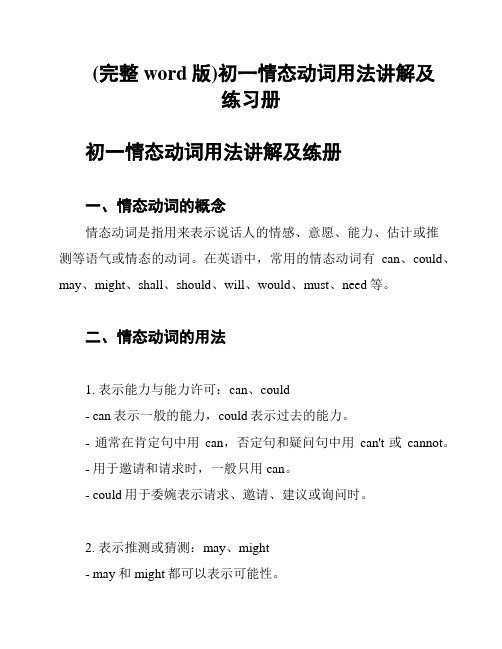
(完整word版)初一情态动词用法讲解及练习册初一情态动词用法讲解及练册一、情态动词的概念情态动词是指用来表示说话人的情感、意愿、能力、估计或推测等语气或情态的动词。
在英语中,常用的情态动词有can、could、may、might、shall、should、will、would、must、need等。
二、情态动词的用法1. 表示能力与能力许可:can、could- can表示一般的能力,could表示过去的能力。
- 通常在肯定句中用can,否定句和疑问句中用can't或cannot。
- 用于邀请和请求时,一般只用can。
- could用于委婉表示请求、邀请、建议或询问时。
2. 表示推测或猜测:may、might- may和might都可以表示可能性。
- may常用于肯定句,might常用于疑问句或否定句。
3. 表示义务或必要性:must、have to、need to- must表示说话人的主观判断,have to表示客观上的必须。
- need to表示需要,用于肯定句。
4. 表示意愿、请求或建议:shall、should、will、would- shall用于疑问句中提出请求或建议。
- should用于陈述句中表示建议或意愿,也可以用于疑问句中。
- will表示意愿,would表示过去经常这样做或愿意做。
- would可以用于表示客气的请求。
三、情态动词的练请根据下列句子,根据语境填入适当的情态动词:1. Can you help me with this homework, please? I _________really appreciate it.3. The weather is getting warmer. It _________ rain later.4. I'm not sure if I _________ make it to the party. I might have other plans.5. _________ you like to have dinner with me tonight?6. You _________ go to bed early, or you'll be tired tomorrow.答案:1. would2. must3. may4. can5. Would6. should7. would以上是关于初一情态动词用法的讲解及练习册。
情态动词语法讲解精编版
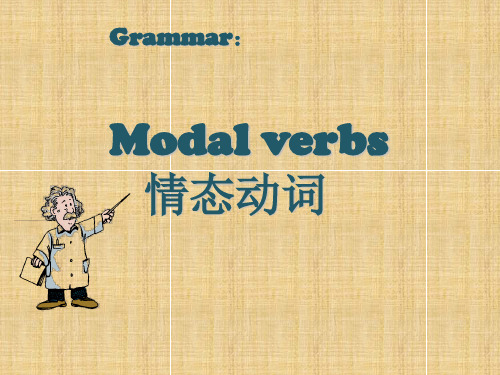
•All men must die.
ought to(表示“推测”)的否定形式是 oughtn’t to
•You oughtn’t to have any difficulty getting the tickets.
过去的不许可:He was not allowed to go.
3表示“义务”和“必然”
a)表示“义务”,可用should, ought to,
must. 表示要求,命令时,语气由ought to、
should、must渐强
Should/ought to表示“应该”,带有敦促,劝说 之意,可交替使用,前者语气更强。
need need not needn’t
一、情态意义表示法
1.表示“能力”和“可能”
a)表示“能力”,可用can, could, be able to can既能表示现在的能力,也表示将来的 能力。 Eg.Look! I can do it.
I can’t do it now, but I can do it later.
过去“能力”: could, was/were
able to
肯定句:
•Could:一般能力
• She could play the piano when she was only six.
• was/were able to(及managed to):具体 事件
• He was able to translate the article without a dictionary.
现在“能力”:can, be able to
情态动词趣味讲解
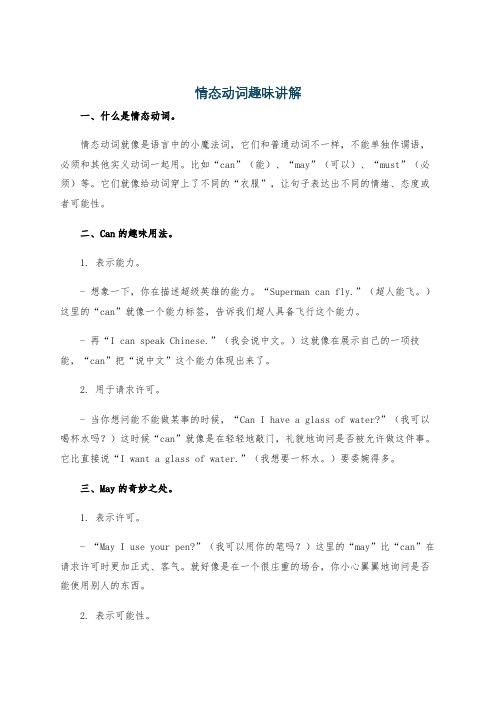
情态动词趣味讲解一、什么是情态动词。
情态动词就像是语言中的小魔法词,它们和普通动词不一样,不能单独作谓语,必须和其他实义动词一起用。
比如“can”(能)、“may”(可以)、“must”(必须)等。
它们就像给动词穿上了不同的“衣服”,让句子表达出不同的情绪、态度或者可能性。
二、Can的趣味用法。
1. 表示能力。
- 想象一下,你在描述超级英雄的能力。
“Superman can fly.”(超人能飞。
)这里的“can”就像一个能力标签,告诉我们超人具备飞行这个能力。
- 再“I can speak Chinese.”(我会说中文。
)这就像在展示自己的一项技能,“can”把“说中文”这个能力体现出来了。
2. 用于请求许可。
- 当你想问能不能做某事的时候,“Can I have a glass of water?”(我可以喝杯水吗?)这时候“can”就像是在轻轻地敲门,礼貌地询问是否被允许做这件事。
它比直接说“I want a glass of water.”(我想要一杯水。
)要委婉得多。
三、May的奇妙之处。
1. 表示许可。
- “May I use your pen?”(我可以用你的笔吗?)这里的“may”比“can”在请求许可时更加正式、客气。
就好像是在一个很庄重的场合,你小心翼翼地询问是否能使用别人的东西。
2. 表示可能性。
- “It may rain tomorrow.”(明天可能会下雨。
)“may”在这里就像一个小预言家,给我们一种不太确定的感觉,只是说有下雨的可能性,不是肯定会下雨。
四、Must的强硬角色。
1. 表示必要性或义务。
- “You must wear a seatbelt in the car.”(你必须在汽车里系安全带。
)“must”就像一个严厉的小警察,规定了你一定要做这件事,没有商量的余地。
2. 表示推测(用于肯定句中)- “He must be at home because his car is in the driveway.”(他一定在家,因为他的车在车道上。
初中英语情态动词的讲解

初中英语情态动词的讲解情态动词是英语中的一类特殊动词,用于表示说话人的态度、推测、能力、许可等。
初中阶段研究英语时,情态动词是一个重要的语法知识点。
本文将对初中英语中常用的情态动词进行讲解。
1. CanCan 是一个情态动词,用于询问和表示能力、可能性、允许等。
是一个情态动词,用于询问和表示能力、可能性、允许等。
1.1 用法- 用于询问能力:Can 用于询问某人是否有能力做某事。
Can用于询问某人是否有能力做某事。
- Can you swim?(你会游泳吗?)- 用于表示可能性:Can 用于表示某事有可能发生。
Can用于表示某事有可能发生。
- It can rain tomorrow.(明天可能会下雨。
)- 用于征求允许:Can 用于请求允许做某事。
Can用于请求允许做某事。
- Can I borrow your pen?(我可以借用你的钢笔吗?)1.2 注意事项- 当 Can 用于疑问句时,其后的动词需用原形。
Can用于疑问句时,其后的动词需用原形。
- Can she play the guitar?(她会弹吉他吗?)2. MustMust 是一个情态动词,用于表示必须,义务和推测。
是一个情态动词,用于表示必须,义务和推测。
2.1 用法- 用于表示必须:Must 用于表示某事是必须的。
Must用于表示某事是必须的。
- You must finish your homework before watching TV.(你必须在看电视之前完成作业。
)- 用于表示义务:Must 用于表示某事是责任所在。
Must用于表示某事是责任所在。
- We must obey the rules.(我们必须遵守规则。
)- 用于表示推测:Must 用于表示一种较为确信的推测。
Must用于表示一种较为确信的推测。
- He must be tired after running for so long.(他跑了这么长时间,一定很累了。
《情态动词讲解》课件

1
表示能力和可能性
这一用法涉及到情态动词在表示一个
表示推测和推断
2
人或事物的能力或可能性方面的应用。
情态动词还可用来表示具有推测性质
的情况和推断。
3
表示义务和建议
情态动词可用于表示某人应该或必须
表示意愿和打算
4
做的事情,或者提出建议。
用情态动词来表达某人的意愿或打算 进行的行为。
情态动词的否定和疑问
3 同时使用情态动词和实义动词时的注意事项
了解使用情态动词和实义动词时需要注意的细节。
总结
情态动词的重要性
深入理解情态动词的重要性,以及它们在语言中 的作用。
情态动词的学习方法
提供一些有效的学习方法,帮助您更好地掌握情 态动词的用法。
参考资料
书籍推荐
推荐一些深入学习情态动词的相关书籍。
网站推荐
建议一些在线资源,以便进一步学习和练习 情态动词。
2 may/might
表示推测和推断的情态 动词。
3 shall/should
表示义务和建议的情态 动词。
4 will/would
表示意愿和打算的情态动词。
5 must
表示必须和必然的情态动词。
情态动词的用法
情态动词有多种用法,我们将详细讨论其中的一些,包括表示能力和可能性、推测和推断、义务和建 议,以及意愿和打算。
特点
情态动词具有几个典型的特点,例如它们没有人称和数的变化,并且后面跟原形动词。
情态动词的种类
情态动词有几种常见的类型,我们将深入讨论其中的几个种类,包括can/could、may/might、 shall/should、will/would以及must。
1 can/could
英语情态动词讲解

可能性的强弱层次
must >should/ought to >can/could > may/might
should/ought to表示推测
根据经验的推测,“应当、应该” e.g. Your photos should be ready by12:00.
could表过去的能力 At that time we thought the story could not be true.
You cannot smoke in the meeting room. (此句的cannot 表示“禁止”)
情态动词can/could
01
can/could 与be able to 相比
may用于表示,应该(多用于法律条文)
03
e.g. He may be a teacher.
may/might表示可能性
02
e.g. May I use your bike?
may表示请求别人允许
01
情态动词may/might
情态动词shall/should
用于第一、三人称,征求对方意见 e.g. Shall we go now? What should we do next ? (用should 比 shall 表示更客气) shall 用于法律、规定,表示义务和规定 g. The sign reads:No person shall smoke here! should表示应该 e.g. You should not judge a man by his clothes.
Modal Verbs
PLEASE ENTER YOUR TITLE HERE
情态动词详细讲解

情态动词, 不论是第三人称单数,还是人称代词主格,宾格,一律用动词原形。
情态动词有can (could), may (might), must, have to, shall (should, will (would), dare (dared), need (needed), ought to等。
情态动词无人称和数的变化;不能单独使用,必须与其后的动词原形构成谓语。
一、can, could1) 表示能力(体力、知识、技能)。
此时可用be able to代替。
●Can you lift this heavy box?●Mary can speak three languages.●Can you skate?Can只有一般现在时和一般过去式;而be able to则有更多的时态。
I'll not be able to come this afternoon.当表示“经过努力才得以做成功某事”时应用be able to,不能用Can。
如:He was able to go to the party yesterday evening in spite of the heavy rain. 2) 表示请求和允许。
-----Can I go now?----- Yes, you can. / No, you can't.此时可与may互换。
在疑问句中还可用could,might代替,不是过去式,只是语气更委婉,不能用于肯定句和答语中。
---- Could I come to see you tomorrow?---- Yes, you can. ( No, I'm afraid not. )3) 表示客观可能性(客观原因形成的能力)。
They've changed the timetable, so we can go by bus instead.This hall can hold 500 people at least.4) 表示推测(惊讶、怀疑、不相信的态度),用于疑问句、否定句和感叹句中。
初中情态动词讲解

can’t 意为“不可能”, 必用在否定句中。
-- The man can’t be Mr. Green. -- He has gone to America.
活动探究 Groupwork
with me. She has gone to go to work.
9.This basketball _c_o_u_l_d_/_m__ig_h_t_ be Ning’s. He plays basketball every day.
10.This school uniform __c_a_n_’_t___ be Nick’s. It’s too
station is
7. Must I finish the work now
No, you __n_e_e_d__n_’t___.
8. --Need I take this book out --Yes , you __D___ . A. can B. may C. need D. must
9. __D____ the girl read before she went to school A. Can B. Must C. Can D. Could
must / must not
must 的用法:
must 必须 ,表示说话人的 主观意志。 You must do your homework first.
must / must not
must not的用法: mustn’t 表示禁止 ,不准,不允许。 You mustn’t smoke here.
否定句在后直接加 not. 3 情态动词如何使用呢?
高中英语知识点归纳情态动词和实义动词的用法讲解
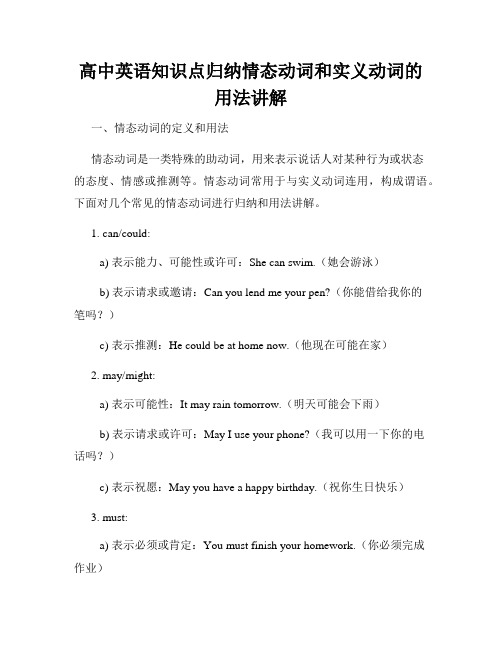
高中英语知识点归纳情态动词和实义动词的用法讲解一、情态动词的定义和用法情态动词是一类特殊的助动词,用来表示说话人对某种行为或状态的态度、情感或推测等。
情态动词常用于与实义动词连用,构成谓语。
下面对几个常见的情态动词进行归纳和用法讲解。
1. can/could:a) 表示能力、可能性或许可:She can swim.(她会游泳)b) 表示请求或邀请:Can you lend me your pen?(你能借给我你的笔吗?)c) 表示推测:He could be at home now.(他现在可能在家)2. may/might:a) 表示可能性:It may rain tomorrow.(明天可能会下雨)b) 表示请求或许可:May I use your phone?(我可以用一下你的电话吗?)c) 表示祝愿:May you have a happy birthday.(祝你生日快乐)3. must:a) 表示必须或肯定:You must finish your homework.(你必须完成作业)b) 用于反问句,表示强烈的建议或命令:Must I go now?(我现在必须离开吗?)4. shall/should:a) shall用于第一人称,表示将来的意愿、承诺、建议或命令:I shall help you with the housework.(我会帮你打扫房间)b) should用于其他人称,表示应该、建议或推测:You should exercise regularly.(你应该经常锻炼)5. will/would:a) 表示将来的意愿、决心或承诺:I will visit my grandparents this weekend.(这个周末我将去看望我的祖父母)b) would用于过去的愿望、习惯或客气的请求:He would always help others when he was young.(他年轻时总是帮助别人)二、实义动词的定义和用法实义动词是指表示实际动作或状态的动词。
(完整版)常见情态动词讲解

常有神态动词解说一、情的定:情有,但它不可以独作,它必和其余一同组成。
情没有人称和数的化;它的后边必跟原形。
二、情的种:情否认形式can能,会can’t不可以,不会could能,会couldn ’t不可以,不会may能够//must必mustn’ t不允,不可以shall将,要shan’t将不要should shouldn ’t不need需要needn’t不用would将会,愿wouldn ’t不会,不肯三、情的用法及主要句型:1、 Can I help you?——Yes, please. / No, thanks.2、 Can + 主 + 原形 ? Yes, ~ can. No, ~ can’ t.3、 Can I borrow your book?----Yes,of course.4、 Can I write on the book? ------No, you can mustn’t’ t.5、 Could \Can you help me?---- Yes,of course.\Certainly.\ Sure.6、 Could \Can you tell me the way to the Zoo?7、 May I come in ?----- Come in, please.8、Sorry, please don’ t.9、 May I have some Coke?---- Yes, of course.10、May/ Could / Can I speak to Tom? -----Speaking. Who ’ s calling?11、should 、 shouldn ’表t示告:1)He should get up early.2)She shouldn ’ t play computer game too much.12、Should +主 +原形 ? Yes, ~ should.\ No, ~ shouldn ’ t.13、表示建“你愿意⋯ ”---Yes, I’ d love to. /I’ d love to. But I’ m busy now.14、就餐用 Would you like something to eat\drink? ----Yes, I’ d like⋯15、shall 用于第一人称 (I, we), 能够表示“将”和表示建“⋯⋯好?”1)Where shall we have dinner?2)Shall we go fishing? -----All right. \OK. \Good idea.16、Must + 主 + 原形 ? ---Yes,~ must.\No, ~ needn’ t.四.常情的区:1. can (could)1)表示能力, could 主要指去。
情态动词知识讲解

情态动词【概念引入】1)情态动词表示说话人对所做动作的观点或态度。
如:需要、可能、意愿、怀疑等。
例如:I must go now.我现在必须得走了。
2)情态动词一般没有人称和数的变化,但是个别情态动词有时态的变化。
例如:can 的过去式是could。
3)情态动词不能单独作谓语,后接动词原形共同做谓语。
例如:I can swim我会游泳。
4)常见的情态动词有:can, may, must, have to, should, would 等。
5)情态动词一般不止一个意思,它的否定式是在情态动词的后面加not,一般疑问句是将情态动词提到句首。
例如:lean ' t speak Frer我不会说法语。
Can you speak Englis?h 你会说英语吗?【用法讲解】1.can 的用法。
1)表能力We can do our homework by ourselves我们可以自己完成作业。
He can swim well他游泳很好。
I can play football but I can ' t p我会踢足球但是我不会弹钢琴。
2)表xxYou can watch TV after supper S 饭后你可以看电视。
You can ' t play basketball in the stre你不能在街上打篮球。
3)表请求Can you help me with my math?尔能帮我学数学吗?Could you lend your book to me?尔能把你的书借给我吗?注意:could 是can 的过去式,但是这里并不表示过去时,而是表示委婉语气。
拓展:can 和be able to 的区别(1)情态动词can只有两种时态形式,现在式can和过去式could,而be able to 有多种时态形式。
在一般过去时中都表示能够时,两者可以互换。
例如:Mary can play the piano.(—般现在时)xx 会弹钢琴。
情态动词讲解分析(全)
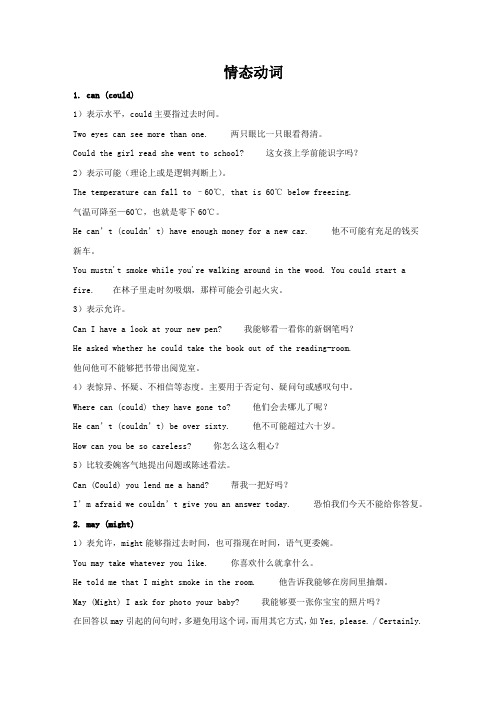
情态动词1. can (could)1)表示水平,could主要指过去时间。
Two eyes can see more than one. 两只眼比一只眼看得清。
Could the girl read she went to school? 这女孩上学前能识字吗?2)表示可能(理论上或是逻辑判断上)。
The temperature can fall to –60℃, that is 60℃ below freezing.气温可降至—60℃,也就是零下60℃。
He can’t (couldn’t) have enough money for a new car. 他不可能有充足的钱买新车。
You mustn't smoke while you're walking around in the wood. You could start a fire. 在林子里走时勿吸烟,那样可能会引起火灾。
3)表示允许。
Can I have a look at your new pen? 我能够看一看你的新钢笔吗?He asked whether he could take the book out of the reading-room.他问他可不能够把书带出阅览室。
4)表惊异、怀疑、不相信等态度。
主要用于否定句、疑问句或感叹句中。
Where can (could) they have gone to? 他们会去哪儿了呢?He can’t (couldn’t) be over sixty. 他不可能超过六十岁。
How can you be so careless? 你怎么这么粗心?5)比较委婉客气地提出问题或陈述看法。
Can (Could) you lend me a hand? 帮我一把好吗?I’m afraid we couldn’t give you an answer today. 恐怕我们今天不能给你答复。
- 1、下载文档前请自行甄别文档内容的完整性,平台不提供额外的编辑、内容补充、找答案等附加服务。
- 2、"仅部分预览"的文档,不可在线预览部分如存在完整性等问题,可反馈申请退款(可完整预览的文档不适用该条件!)。
- 3、如文档侵犯您的权益,请联系客服反馈,我们会尽快为您处理(人工客服工作时间:9:00-18:30)。
Modal Verbs表示说话人的情绪、态度或语气的动词叫情态动词。
1)情态动词不能单独作谓语,没有人称,数的变化,即情态动词第三人称单数不加-s。
2)情态动词的否定式是在情态动词后面直接+not。
3)情态动词的疑问式是把情态动词提到主语前。
can, could(be able to)may, mightmust (have to)will, would shall, should ought to needdareI.can/ could1.___Can___ you speak Japanese? Just a little.2.Only the judge ___can___ save her from prison.3.I ___could___ drive a car before I left middle school.4.It was so dark that I ___could___ see nothing.Note: 表能力、有权力(could是can的过去式)5.--___Can/Could ___ I go home now? --Yes, you can.–No, you can’t.6.--___Can/Could___ I speak to Andrew?7.You ___can’t___(not)smoke here.Note: (口语)允许、请求,表可以(could非can的过去式,表委婉)8.It ___can___/could ____ be very cold here, even in spring.9.She is clever, but she ___can___/could___ be dull sometimes.Note: (表示偶然现象发生的可能性)有时会,时而可能10.It ___can’t___/couldn’t___(not) be my father. He is abroad now.11.There is someone outside. Who ___can___ it be?12.You __can’t/couldn’t have seen him__ (not see) him. He was not there.13.She __ can’t/couldn’t have been ___(not be) more than six then.14.He __ can’t/couldn’t have finished___ (not finish) the work last night withoutyour help.Note: 表推测(否定、疑问句)15.He __could have told__(tell) me the answer but he refused to.Note: 过去本能做而没有做16.You _cannot/ can never_________ do the work too well.17.You _cannot /can never__ be careful enough in your study.Note: cannot…too; can never... too; cannot enough再…都不为过;越…越好can & be able to区别:1. can 只有两种时态现在时can & 过去时couldbe able to 有各种时态2. 用于一般所具有的能力,可以互换,但是当表示成功做到时,通常用be able to或manage to1.He _can/is able to_ write music.2.We shall __be able to__ finish the work soon.3.I haven’t_been able to_ find the book.4.He _could/was able to__ swim like a fish when he was young.5.I talked with her for a long time and finally I __was able to_ make her believeme.6.The fire spread through the building quickly but everybody ___was able to/managed___ to escape.II.may/might1.--__May___ I leave now?--Yes, you __may__./Yes,please.--No, you __may not /can’t/mustn’t___.2. He asked if he _might_____ use the phone.3. We start early so that we _may/might___ arrive in time.Note: (允许、请求)可以4. __May__ you be happy all your life.Note: 祝、愿5. John is absent. He __may/might_____ be ill.6. It _may/might______ rain tomorrow or it __may/might_____ be merely cloudy.7. I can’t find my book. I _may/might have left___(leave) it in your office just now.8. You know this story very well. You _may/might have read___(read) it before. Note: 表推测9. We start early so that we ___may ___ arrive in time.10. I wrote down his telephone number so that I ___might___ remember it. Note: 表目的(用于目的状语从句中)maybe & may be11. He ___may be ___ here. I’m not sure.12. ____Maybe______ you should call him.13. –Are you going out tonight?-- ____Maybe____.III.must1.You __must___ have a passport if you want to go abroad.2.Drivers __mustn’t___ drive after drinking.Note: (义务、责任、强制、命令)必须应该3.You _must_______ first finish your homework before you watch TV.4.--_Must________ I come tomorrow?--Yes, you __must____.--No, you __needn’t/ don’t have to_____.Note: (说话者主观上的意愿、建议、命令等)应该、必须、务必5.Winter __must___ be followed by spring.6.All living things ___must___ die.Note: 表示客观规律不可避免性或必然性,注定要,必然(只用于肯定句)7.You __must___ be ill. I can see it from your face.8.You __must have read___(read) the book. You know the story very well.9.There’s much noise from next door. They __must be having__(have) a party. Note: 表肯定推测Must & have to区别:1. have to 用于各种时态,还可和其它情态动词连用2. have to 表示因客观环境的迫使而不得不做某事1.-- Let’s see a movie tonight.--I’d love to, but I __have to____ take care of my mom.2. They __had to__ speed up, for the weather turned terrible.3. They will ___have to ___ get up early tomorrow.4. We may ___have to___ put off the plan.5. You ___don’t have to ___ tell him about it.不一定要6. You ___mustn’t ___ tell him about it. 一定不要IV.shall1.I __shall________ ring you as soon as I arrive.Note:将来时(第一人称)将要、会2.__Shall______ I open the window for you?3.Let’s go to the cinema tonight, __shall___we?Note: (在问句中表示说话人征求对方意见或提出建议,用于第一、三人称)…好么V. should & ought to1.We hoped that we __should______ be able to do that.Note: 用于过去将来时2.You _should/ought to____ be more careful next time.3._Should____ I call him and apologize?Note: (表示建议、劝告、命令、要求) 应该,必须(ought to 语气强)4.It’s 4:30. They __should______ be in New York by now.Note: (表示说话者根据一定的依据猜测、推测、推论等)该,可能5.You _should have told__(tell) me earlier about it, but you didn’t.6.You __shouldn’t have done_________ (do) that to your mother, but you did. Note: 过去按理该…而实际没有…(常有责备、埋怨、惋惜之意)VI. will1.He _will____ come back soon.Note: 将来时2.I hope you __will____ succeed.3.I __will____ do my best to help you.Note: (表意愿、决心、承诺)要、愿、想、会、保证4.When he is in trouble, he __will______ turn to his coach for help.5.I _will___ turn you out of doors if you don’t keep quiet.Note: 状语从句VII. would1.He told us that he __would______ meet us at the airport.Note: 过去将来时2.--__Would______ you mind my smoking?--Yes, _please don’t. /You’d better not. _______________.---No, __go ahead______________Note: 提出请求、邀请(委婉)3.I __would________ like to see a film tonight.4.I _would____ rather not leave you here.5._Would __ you please _not smoke____(not smoke) here?Note: 意愿、决心、喜欢等6.He _would_________ be delighted if I went to see him.7.If you had come earlier, you _would have seen__(see) him.Note: 条件句(虚拟)8.When he was young, he __would__often __walk___ (walk) in these woods.Note: (表过去习惯性、经常性的行为或动作)总是VIII. need (情态动词没有过去式)Note: 1) need 作实意动词,有人称、时态和数的变化2) need 作情态动词,只能用在否定句和疑问句中,没有人称、时态和数的变化need sth don’t need sth Do … need sth ?need to do don’t need to do Do …need to do… ?needn’t do Need …do …?1.He __needs to_________(go) there now.2.He _need not/ doesn’t need to go__ (not go) there now.3.--__Need_/Does ______he ____go_/need to go___(go) there now?-- Yes, he _must__/does______.--No, he _needn’t_/doesn’t________.4. He needs to finish the work by Friday, ___doesn’t______ he?5. He needn’t stay there, __need_______ he?6.He __needn’t have given_____ (not give) her so much money at the time, andnow he regrets it.Note: needn’t have done过去本不必做却做了need doing & need to be done7.I _need to__ (repair) the computer.The computer __needs repairing_____.(repair)The computer __needs to be repaired____(repair)IX. dare (情态动词有过去式dared)Note: 1) dare作实意动词,有人称、时态和数的变化2) dare作情态动词,只能用在否定句和疑问句中,没有人称和数的变化, 但有过去时。
